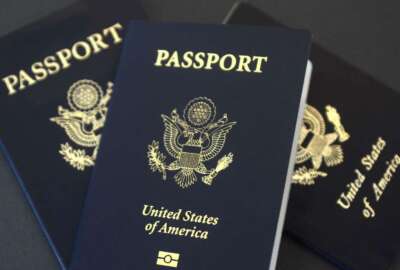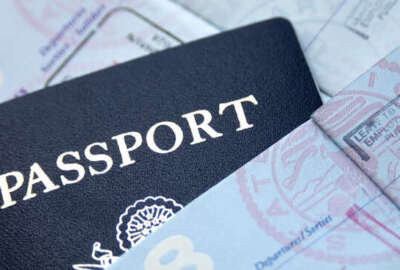Hubbard Radio Washington DC, LLC. All rights reserved. This website is not intended for users located within the European Economic Area.
On Air: Federal News Network
Trending:
Warner says passport backlog ‘not sustainable,’ as State Dept aims for pre-pandemic processing times
Sen. Mark Warner (D-Va.) says the current wait times for passports are “not sustainable," and urged the bureau to take more aggressive steps to address a majo...
When Carlo Aalst submitted his online application to renew his passport in January, he expected to receive it in time for a trip to Italy he planned for mid-March.
Six months later, Aalst, an Alexandria, Virginia resident, said his passport never arrived in the mail — and with a trip to Ecuador coming up this weekend to see his mother, who has been diagnosed with Alzheimer’s disease, he scrambled to get answers from the State Department.
“I actually had to start from zero,” Aalst said in an interview Friday. “I tried calling the toll-free number that is listed on the State Department’s website, but that number doesn’t work.”
After a few Google searches, Aalst said he found another number “listed in a hidden part of the State Department’s website.”
He called the number and managed to schedule an in-person appointment at the Washington Passport Agency located downtown.
Once he arrived at the passport agency, he waited for more than two hours, as employees tried to reconcile his online application — which he filed as part of a six-month pilot that stopped accepting applications in February — with the application he was filing in person.
Aalst told Federal News Network he successfully picked up his renewed passport on Friday afternoon.
“I’m so relieved,” he wrote in a text message. “I can finally tell my family in Ecuador that I’m on my way there.”
Sen. Mark Warner (D-Va.), speaking outside the Washington Passport Center, after a meeting with State Department leaders, said the current wait times for passports are “not sustainable,” and urged the bureau to take more aggressive steps to address a major backlog.
A State Department spokesperson told Federal News Network that routine passport processing currently takes about 10-13 weeks, and that expedited processing, which costs an extra $60, takes about 7-9 weeks.
The spokesperson said the department aims to return to pre-pandemic processing times by the end of the calendar year. Aalst, however, said he still encountered delays receiving his passport, even though he paid for expedited processing.
“I was on the phone all the time trying to get somebody to help me, and I was told, ‘Unfortunately, even though you paid for the expedited service, everybody else is doing the same thing.’ So basically, the express service doesn’t really work, because everything is expedited, which means nothing is expedited,” he said.
Warner said his office has helped more than 1,500 constituents obtain their passports so far this year — a record number since the start of the COVID-19 pandemic. Prior to the pandemic, Warner estimated that his office helped about 1,000 total constituents with their passports between 2009 and 2020.
“It shouldn’t be your normal course of business that you have to go through your U.S. senator’s office to get your passport renewed on a timely basis,” Warner said.
Warner said the department may have already seen the worst of its surge of cases this summer, but the spokesperson said the department anticipates increased demand for passports will continue.
“The department is experiencing a surge in passport demand, and during some weeks we are seeing twice as many applications pending compared to the same point in FY 2022,” the spokesperson said.
The department is receiving approximately 400,000 applications each week. Between January and May this year, it received more than 500,000 applications a week.
The spokesperson said the department is seeing fluctuations in its backlog, and is unable to provide an overall total backlog.
The State Department set a record last year when it issued about 22 million passport books and cards last year. But the department is on track to break that record and issue about 25 million passport books and cards this year — about a 15% increase from last year.
To drive down those wait times and chip away at its backlog, Warner is calling on the State Department’s Bureau of Consular Affairs, which manages passport services, to ramp up hiring.
“We need more people on the phones, at the windows. We need more — as so many [in] government services — in the IT division, so we can bring modern IT services to this process,” Warner said.
The bureau hired 177 new passport adjudicators this year, growing its workforce by about 10% — and it looking to grow its workforce by an additional 10%.
“We are focused on hiring, training, and retaining staff to address the current surge in demand. We have increased staffing levels and have hundreds of additional staff in the hiring pipeline,” the department spokesperson said.
Passport services employees are working tens of thousands of hours of overtime a month. Between January and June, Consular Affairs authorized between 30,000 and 40,000 overtime hours each month.
The State Department is also deploying “surge teams” of volunteers, including retirees and new hires, to process passports before reporting to other assignments.
The department, however, is facing hiring delays because new passport adjudicators need security clearances before they can start working.
Warner, who has long championed efforts to drive down security clearance wait times across the federal workforce, said agencies have set a goal of getting secret clearances done within 30 days.
“I didn’t expect four years ago, when I took on security clearance reform, to say that it was going to be a 10-year process,” Warner said. “We’ve got to hold the passport agency as well as the intel community to those standards. They’re getting better, but it’s still not here.”
Warner said a “perfect storm” of events led to the department’s major backlog — the Bureau of Consular Affairs is funded through fees, but saw a 50% drop in revenue at the height of the pandemic and had to freeze hiring.
Assistant Secretary of State for Consular Affairs Rena Bitter told members of the House Foreign Affairs Committee in June that the bureau had to freeze hiring during the height of the pandemic, but emergency appropriations from Congress kept the bureau from having to lay off employees.
The State Department started bringing employees back to the office in the summer of 2020, well before most agencies launched a return-to-office effort. All passport adjudicators have been back in the office since August 2021.
Once the bureau started bringing in more revenue in late 2021, it resumed hiring passport adjudicators. Bitter said the bureau started hiring more overseas adjudicators in the beginning of 2022, and that some overseas positions remain vacant.
“I think what should have happened, candidly, is we should have seen this coming and pump this up earlier,” Warner said.
Warner said the department also plans to bring its online passport renewal system back online in January 2024, after rolling the platform out as a six-month pilot.
The department began testing an online passport renewal option in February 2022, and invited federal employees and contractors to apply. Between February and August 2022, the department received 10,000 online passport applications.
The State Department expanded the audience to include the general public in August 2022.
Since that time, over 500,000 customers submitted applications through the online platform. The department, however, temporarily closed the online renewal service to new customers on Feb. 7.
While the online process saw a 90% approval rating from users, Warner acknowledged that some online applicants, like Aalst, have yet to receive their passports.
“I think they should have been clear that this was a six-month pilot. And anytime you do a pilot with IT services, there’s going to be bugs,” Warner said. “This is a problem that is not just with the passport authority. This is a problem throughout government — that IT services are always, ‘Well, we need to get to that,’ and it’s always pushed off,” Warner said.
Copyright © 2024 Federal News Network. All rights reserved. This website is not intended for users located within the European Economic Area.
Jory Heckman
Jory Heckman is a reporter at Federal News Network covering U.S. Postal Service, IRS, big data and technology issues.
Follow @jheckmanWFED




